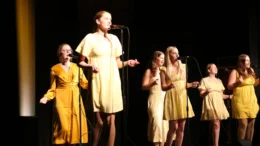LOS ANGELES (AP) — Modern reality television has been misbehaving since it was born.
Putting aside the charmingly mild “Candid Camera” midcentury years, the reality TV era that began in the early 1990s with MTV’s “Real World” has encompassed its share of questionable standards and tactics.
Both contestants and viewers risk taking the brunt of the genre’s baser tendencies. “Bachelor in Paradise” halted production on its fourth season earlier this month to investigate allegations of undisclosed wrongdoing during taping in Mexico.
Producer Warner Bros. said Tuesday that its review found nothing amiss and ABC put the show back on track for a summer debut. Attorney Martin Singer, who is representing contestant Corinne Olympios, said not so fast: He vowed a separate investigation.
It’s yet another milestone in reality’s checkered history, which remains as consistent as TV’s reliance on it even with the expanding popularity and ranks of scripted series.
While reality ratings have slipped, there is a solid fan base for so-called unscripted TV — which isn’t as freewheeling as it sounds, said Karen Tongson, a University of Southern California associate professor whose focus includes pop culture.
“American TV viewers are savvy these are set pieces, not scenarios coming from thin air,” Tongson said of reality shows in general. She suggests viewers check out Lifetime’s drama “Unreal” to see how the reality process works.
“The cast members and the production team are doing what they can to create sensational plotlines to follow and to sustain their story line and presence on TV,” she said.
But limits are observed, said Troy DeVolld, a veteran reality producer whose credits include “Basketball Wives” and “Dancing with the Stars.”
“I’ve never seen a producer not take care of someone in a situation where there might be danger or liability,” he said. “We always err on the side of caution.”
Reality is an easy punching bag, he contends, while other TV trespasses are ignored.
“No one’s ever been murdered in a non-scripted show that I’ve seen. Half the scripted shows are, ‘We found a body in a suitcase down in the river, and now we’re doing an autopsy,” DeVolld said. “You don’t see that in reality TV, so I don’t understand why it’s so much more damaging.”
But put reality TV under the spotlight and offenders can be found, including the following candidates:
WHAT A CONCEPT
— “Temptation Island” invited couples to test their fidelity by splitting up and hanging out with attractive singles on separate islands. Divorce and breakup rates haven’t been high enough, apparently.
— “Cheaters.” People who believe their partner may be unfaithful hire a detective and get the chance to see them humbled nationally on camera on this long-running syndicated TV series.
— “Chains of Love,” in which players whittled down a group of prospective mates, some insulting the rejects as they tossed them aside. And yes, the lovebirds were chained together for their “dates.”
JUST DUMB
— “I Wanna Marry Harry,” in which American women compete to woo a man whose they’re told is England’s Prince Harry but is (surprise!) an impostor. The women are deceived, viewers are unimpressed, Britain survives.
— “Who Wants to Marry a Multimillionaire,” which encouraged women to compete to wed a total stranger. “I don’t think I was thinking clearly,” winner Darva Conger said as she announced plans for an annulment.
JUST UGLY
— The Seattle-based edition of “Real World” in 1998 included a confrontation in which one contestant claimed that another one was gay, and he in turn slapped her.
— On “The Real Housewives of New Jersey,” a cast member flipped over a dining table while screaming a nasty epithet about another, part of the show’s pastiche of yelling and screaming.
— “Jersey Shore” and “Teen Mom,” grouped for their especially repellent scenes of, respectively, a woman being punched and a violet argument in front of a child.
IN A CLASS OF ITS OWN
— “Big Brother,” a self-described “social experiment,” has repeatedly proven a camera-filled hothouse for racist comments and name-calling by various contestants.
When the show debuted with a splash in 2000, CBS executive Leslie Moonves acknowledged the unpredictability of putting people’s private lives on TV but said, “We have nothing to apologize for.”



































